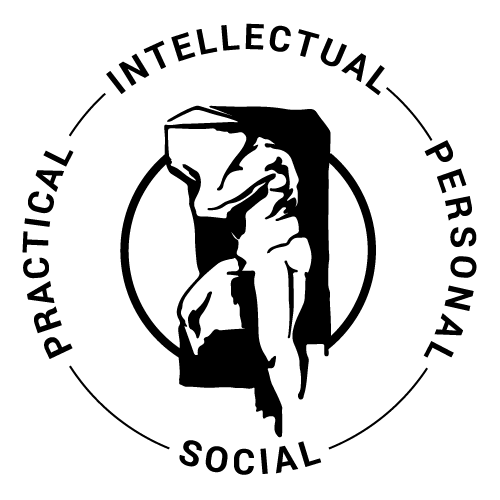MONTESSORI AND LIBERTY
What’s the best way to teach and learn the ideas, values, and virtues needed in a free society? Is it enough to lecture and write about them? Those have been the favored methods used by free society advocates for decades.
But actions speak louder than words – there is strong evidence that people cannot learn how to live as free persons unless they have the experience of self-governance as well as the ideas. Most children spend a large part of their day and experience many of their social interactions in school. Their actions and experiences in school form a micro-society. How should we craft that micro-society to give students the experiences they need for autonomy?
As you likely know, I am a staunch advocate of the authentic Montessori Method for imbuing children with such experiences. The program ingeniously respects and encourages individual development, powerful thinking skills, civil behavior, respect for the property and persons of others, and much more.
The Montessori approach is deeply embedded in all The Great Connections programs in ways that are appropriate for the young adult level.
One of my projects is to raise awareness about
how the method of learning is as
important as the content.
Happily, Liberty Fund helped me in this through a conference which they hosted
here in Chicago. Philosophy professor Nick Capaldi and I
created the seminar “Montessori and Liberty,” which Liberty Fund hosted here in
Chicago April 11-14th.
Liberty Fund Fellow Eleanor Schneider was a
superb help in creating a deeply engaging set of readings that examined the
Montessori Method in a challenging way. We contrasted works such as
Montessori’s work and experiences – including her remarkable encounter with
Spanish anarchists in Barcelona, recounted in “Respect This House” and her explanation of how she formulated her method in Discovery
of the Child– with John Dewey’s
collectivistic Pedagogic Creed and E.D. Hirsch’s “The Schools We Need And Why We Don’t Have
Them.”
Through these, we enjoyed intense discussion with a highly knowledgeable and
thoughtful group including such lights as Diana Smith Butler, an superb and
highly experienced Montessori teacher-trainer, to philosopher Stephen
Hicks, psychiatrist Raymond Raad,
Institutional Designer, book editor, and former Montessori student Leslie Marsh, economics
professor and mother of eight Catherine Pakaluk and philosophy professor Holly Hamilton-Bleakley, mother of seven – among many other distinguished guests.
I was very pleased that all the participants expressed high enthusiasm for the topic.
Leslie Marsh was astonished to realize through the readings that his Montessori experience had shaped his entire life and career!
My hope is that everyone went away with a renewed understanding of what’s needed to advance the ideas of reason, individualism, and freedom.
As French aristocrat Alexis de Tocqueville observed in the 1830’s after traveling around the young U.S. and analyzing its unique characteristics:
“I am still further from believing, as do a great number of people in Europe, that it suffices to teach men to read and to write to make them citizens immediately.
“Genuine enlightenment arises principally from experience, and if one had not habituated the Americans little by little to govern themselves, the literary knowledge that they possess would not greatly help them today to succeed in it.” – Alexis de Tocqueville, Democracy in America


SOCRATIC EDUCATION
In The Great Connections we use a particular format of Socratic seminars – specifically, reason-and-evidence-based collaborative conversations. This format goes hand-in-glove with the Montessori philosophy of fostering independent thought, excellent collaborative skills, and learning through individual interest.
I was fortunate to be invited as a facilitator to an ingenious workshop on Socratic education last weekend. Rachel Davison Humphries, Director of Outreach for the Bill of Rights Institute, created the program. She and I had worked together many times at The Great Connections.
She designed an experience for middle and high school teachers that seamlessly moved from brainstorming activities to guided reflections on what make seminars work best to several Socratic seminars on challenging texts such as Lincoln’s “The Perpetuation of Our Political Institutions” to Martin Luther King’s “Letter From Birmingham Jail.” Her aim was to further disseminate the idea that the classroom forms a micro-society, and raise awareness that certain teaching practices best further the culture of a free society. The teachers seemed excited by the learning – hopefully, their students will benefit!

LATE BLOOMERS
Forbes’ publisher Rich Karlgaard’s new book, Late Bloomers, looks like just the antidote to the contemporary mania to achieve all good things early in life.
You must achieve early to do anything and be anyone of significance! This is the darling view of Silicon Valley and of so many students (and their parents) today, bent on getting into only the “top” schools and “best” companies. Karlgaard argues that some of the greatest achievements happen late in life because they require years of experience and development. As the NPR article notes, late bloomers tend to be explorers, pursuing their natural curiosity.
“Based on years of research, personal experience, interviews with neuroscientists, psychologists, and countless people at different stages of their careers, Late Bloomers reveals how and when we achieve our full potential—and why today’s focus on early success is so misguided, and even harmful.” Bottom line: give people space! Each one is different. This IS the Montessori way.



